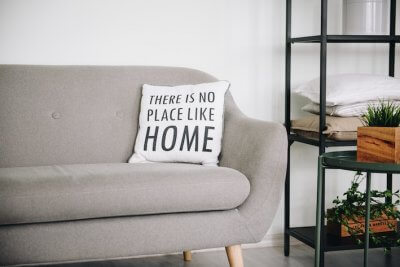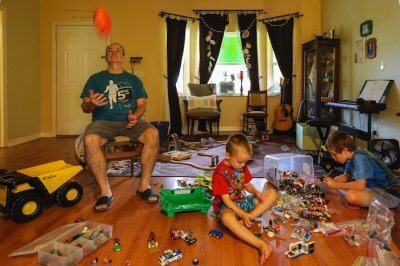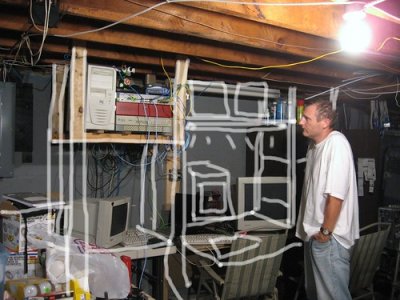Your Living Space and Your Mental Health – 7 Ways to Make it Work

photo by Anastasiia Chepinska
by Andrea M. Darcy
If ever there was a time to make sure your living space wasn’t negatively affecting your mental health, a lockdown would be it.
7 Ways to Troubleshoot Your Living Space
How can you make sure your home isn’t bringing you down?
1. Take an honest appraisal of your home’s health.
It’s well known that unhealthy housing is linked to physical illness. A classic example is damp, mould and poor ventilation causing respiratory issues.
But studies found that a definite mental health link as well. And it can be something as simple as making your house warmer.
A review looking at 19 studies assessing health impacts of improving heating and energy efficiency in homes saw almost a third point to improved mental health and even improved relationships.
- What things about your living space have you long overlooked or delayed fixing?
- How does it make you feel when you take the time think about it?
- Write a list of all the steps that would have to be taken to to fix the main issue. Is there any step you could take this week?
2. Clear the way to wellbeing.
No, you don’t have to Marie Kondo it all and live like an endlessly decluttering minimalist monk, but it’s worth asking if you have too much stuff.
A four-year study at UCLA in America went into middle-class homes and discovered that rewarding ourselves materially, leading to stuff everywhere, may increase our stress, particularly if we are moms. Psychologists noted mothers used words like ‘mess’ and ‘very chaotic’ to describe their homes. Measurements of saliva found a link between the way mothers talk about their houses and their diurnal cortisol levels, a measure of stress.

photo by Mich Haupt
Middle class dads, on the other hand, didn’t seem to have the same problem with clutter in their living space… read into that what you will.
3. Listen in to your living space.
Background noise can be something we get used to, but that doesn’t mean it’s good for us.
Strong examples here are traffic and airplane noises. One study linked an increase in only 10 decibels of airplane noise in a community to a 28% rise in anxiety medication use. Another study showed that people living in areas with high traffic noise were 25% more likely to suffer depression.
But it doesn’t have to be so extreme. We can get accustomed to sounds like a dripping tap or humming fridge. But they can leave us tired or disturb our sleep without our realising it. They are easy things to fix, but can be something we endlessly put off.
4. Bin the bad memories.
Yes, the objet d’art on your mantlepiece might have been an expensive gift. But if it’s from someone who then treated you badly, each time you look at it your unconscious mind is making the link. You might even be stopping yourself from moving on.
Do an honest inventory of things in your living space connected to things you’d be better off forgetting. If you aren’t convinced, try putting the article away in an attic or cupboard for a month or two.
5. Organise in a way that feels right.

By: Qfamily
Not everyone thinks the same way. So while you might look at your friend’s closet full of perfectly folded and colour coded clothes and feel envious? The process of folding and lining up clothes might leave you so frustrated you sink into a low mood, particularly if you are creative, or suffer from adult ADHD.
In her book, ‘Organising for the Creative Person, Dorothy Lehmkuhl suggests that right brained types simply think differently. For example, having large bins you toss clothes into based on type might work far better for you. And you work better with piles of paperwork kept in flat boxes over upright files. Be creative.
6. Mark your territory.
Live with family? Share your bedroom and office space with your partner? Sometimes we all need that proverbial ‘room of one’s own’ to help us feel grounded. Even if it just means a line of tape dividing an office in two, and deciding on what hours each person gets the office to themselves. Or clearing out a storage closet and making it into a mini meditation room.
In his book Environmental Psychology, Tony Cassidy points out that:
“We need… to have our own private space and time. What is important is to feel we have control over this process, so that we can choose to be alone or with others. It is when this control is removed that psychological stress occurs.”
7. Bring in some love.

photo by Eric Froehling
We can become so used to living in an environment, we think we are okay with things we originally weren’t. The furniture we bought as a temporary measure then never replaced, or the art that came on the walls as we are renting a furnished place. But think again.
A large-scale review focused on understanding how physical environments impact our cognitive and emotional resources and wellbeing drew on data from over 280 academic articles. Although they concluded that more rigid research was needed, it was confirmed that what we see, smell, touch, taste, and hear does indeed have powerful effects.
Room layouts and poor lighting were connected to diminished learning capacity, and even things like floor patterns and finishing materials were connected to anxiety and agitation in those who already had mental health concerns.
- Even if you are in a pre-furnished flat, what things can be hidden, stored, or covered?
- What sorts of objects and colours make a place feel safe and comforting to you?
- How could your living space be made to feel more like home?
Can’t feel good at home or anywhere? Just depressed and feeling stuck? We connect you with a highly regarded team of expert talk therapists in Central London. Or try our UK-wide booking site to find a counsellor near you or an online talk therapist you can work with from anywhere.
Want to share your top tip for a living space that works for wellbeing and mental health? Use the comment box below. Note that we cannot provide counselling or diagnosis over comments.
Written by….
Andrea M. Darcy is a mental health and wellbeing expert and writer. Often a digital nomad, she has probably lived in far more living spaces than you, in an impromptu experiment on the effects of environment on wellbeing! Find her on Instagram @am_darcy
is a mental health and wellbeing expert and writer. Often a digital nomad, she has probably lived in far more living spaces than you, in an impromptu experiment on the effects of environment on wellbeing! Find her on Instagram @am_darcy




